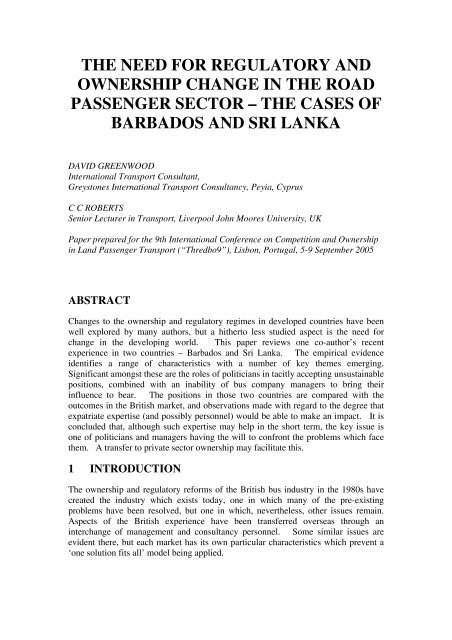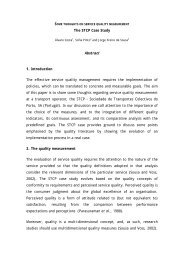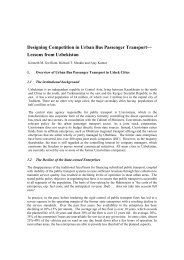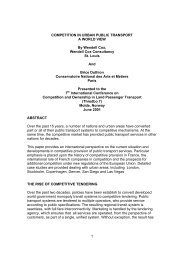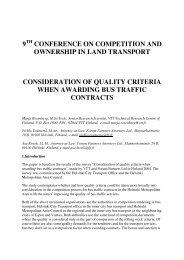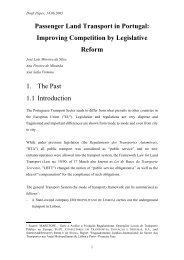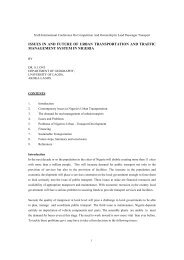the need for regulatory and ownership change in the road ...
the need for regulatory and ownership change in the road ...
the need for regulatory and ownership change in the road ...
You also want an ePaper? Increase the reach of your titles
YUMPU automatically turns print PDFs into web optimized ePapers that Google loves.
THE NEED FOR REGULATORY AND<br />
OWNERSHIP CHANGE IN THE ROAD<br />
PASSENGER SECTOR – THE CASES OF<br />
BARBADOS AND SRI LANKA<br />
DAVID GREENWOOD<br />
International Transport Consultant,<br />
Greystones International Transport Consultancy, Peyia, Cyprus<br />
C C ROBERTS<br />
Senior Lecturer <strong>in</strong> Transport, Liverpool John Moores University, UK<br />
Paper prepared <strong>for</strong> <strong>the</strong> 9th International Conference on Competition <strong>and</strong> Ownership<br />
<strong>in</strong> L<strong>and</strong> Passenger Transport (“Thredbo9”), Lisbon, Portugal, 5-9 September 2005<br />
ABSTRACT<br />
Changes to <strong>the</strong> <strong>ownership</strong> <strong>and</strong> <strong>regulatory</strong> regimes <strong>in</strong> developed countries have been<br />
well explored by many authors, but a hi<strong>the</strong>rto less studied aspect is <strong>the</strong> <strong>need</strong> <strong>for</strong><br />
<strong>change</strong> <strong>in</strong> <strong>the</strong> develop<strong>in</strong>g world. This paper reviews one co-author’s recent<br />
experience <strong>in</strong> two countries – Barbados <strong>and</strong> Sri Lanka. The empirical evidence<br />
identifies a range of characteristics with a number of key <strong>the</strong>mes emerg<strong>in</strong>g.<br />
Significant amongst <strong>the</strong>se are <strong>the</strong> roles of politicians <strong>in</strong> tacitly accept<strong>in</strong>g unsusta<strong>in</strong>able<br />
positions, comb<strong>in</strong>ed with an <strong>in</strong>ability of bus company managers to br<strong>in</strong>g <strong>the</strong>ir<br />
<strong>in</strong>fluence to bear. The positions <strong>in</strong> those two countries are compared with <strong>the</strong><br />
outcomes <strong>in</strong> <strong>the</strong> British market, <strong>and</strong> observations made with regard to <strong>the</strong> degree that<br />
expatriate expertise (<strong>and</strong> possibly personnel) would be able to make an impact. It is<br />
concluded that, although such expertise may help <strong>in</strong> <strong>the</strong> short term, <strong>the</strong> key issue is<br />
one of politicians <strong>and</strong> managers hav<strong>in</strong>g <strong>the</strong> will to confront <strong>the</strong> problems which face<br />
<strong>the</strong>m. A transfer to private sector <strong>ownership</strong> may facilitate this.<br />
1 INTRODUCTION<br />
The <strong>ownership</strong> <strong>and</strong> <strong>regulatory</strong> re<strong>for</strong>ms of <strong>the</strong> British bus <strong>in</strong>dustry <strong>in</strong> <strong>the</strong> 1980s have<br />
created <strong>the</strong> <strong>in</strong>dustry which exists today, one <strong>in</strong> which many of <strong>the</strong> pre-exist<strong>in</strong>g<br />
problems have been resolved, but one <strong>in</strong> which, never<strong>the</strong>less, o<strong>the</strong>r issues rema<strong>in</strong>.<br />
Aspects of <strong>the</strong> British experience have been transferred overseas through an<br />
<strong>in</strong>ter<strong>change</strong> of management <strong>and</strong> consultancy personnel. Some similar issues are<br />
evident <strong>the</strong>re, but each market has its own particular characteristics which prevent a<br />
‘one solution fits all’ model be<strong>in</strong>g applied.
One of this paper’s co-authors, with many years of experience <strong>in</strong> <strong>the</strong> British bus<br />
<strong>in</strong>dustry, had <strong>the</strong> opportunity to work <strong>in</strong> two such countries <strong>and</strong> was able to observe<br />
<strong>and</strong>, to some degree, <strong>in</strong>fluence policy. It is observations recorded dur<strong>in</strong>g <strong>the</strong>se<br />
periods which <strong>for</strong>m <strong>the</strong> basis of <strong>the</strong> data used with<strong>in</strong> this paper. The aim is to<br />
exam<strong>in</strong>e <strong>the</strong> policies followed <strong>in</strong> Barbados <strong>and</strong> Sri Lanka, to identify potential<br />
solutions to <strong>the</strong> problems which rema<strong>in</strong>, <strong>and</strong> to reach conclusions concern<strong>in</strong>g <strong>the</strong><br />
transferability of policies between countries.<br />
The paper beg<strong>in</strong>s with a very brief overview of <strong>regulatory</strong> <strong>and</strong> <strong>ownership</strong> <strong>change</strong><br />
with<strong>in</strong> <strong>the</strong> British market. In sequence, <strong>the</strong> next two sections <strong>the</strong>n provide an<br />
overview on operations <strong>in</strong> Barbados <strong>and</strong> Sri Lanka. The analysis consists a series of<br />
comparisons between <strong>the</strong>se two countries with <strong>the</strong> British experience to allow<br />
conclusions to be reached.<br />
Gwilliam (2003), <strong>in</strong> a previous paper <strong>in</strong> <strong>the</strong> Thredbo series, used Sri Lanka as one of<br />
his examples when exam<strong>in</strong><strong>in</strong>g <strong>the</strong> implementation of franchis<strong>in</strong>g systems <strong>in</strong><br />
develop<strong>in</strong>g <strong>and</strong> transitional economies. This paper, by virtue of its primary data<br />
source, places <strong>the</strong> emphasis at <strong>the</strong> level of operational management, ra<strong>the</strong>r <strong>the</strong> more<br />
strategic approach taken by Gwilliam.<br />
2 BRITAIN<br />
A summary of developments with<strong>in</strong> <strong>the</strong> British market over <strong>the</strong> last 20 years is<br />
provided <strong>in</strong> table 1, <strong>in</strong> order to provide a framework aga<strong>in</strong>st which <strong>the</strong> experiences of<br />
Barbados <strong>and</strong> Sri Lanka can later be compared.<br />
Table 1: Bus <strong>in</strong>dustry <strong>regulatory</strong> <strong>and</strong> <strong>ownership</strong> developments: 1986 to date<br />
Pre-1986 issues Regulatory <strong>and</strong> <strong>ownership</strong> Outcomes<br />
<strong>change</strong>s<br />
Decl<strong>in</strong>e of market<br />
<strong>for</strong> bus services.<br />
Ris<strong>in</strong>g <strong>in</strong>dustry<br />
subsidy.<br />
Ris<strong>in</strong>g costs of<br />
service<br />
provision, with<br />
resultant<br />
pressure on<br />
fares.<br />
Str<strong>in</strong>gent regulation<br />
of services <strong>and</strong><br />
fares.<br />
Lack of <strong>in</strong>centive<br />
on operators to<br />
<strong>in</strong>novate.<br />
Replacement of Road Service<br />
Licens<strong>in</strong>g by statutory<br />
service registration (outside<br />
London).<br />
Subsidy only <strong>for</strong> services that<br />
would o<strong>the</strong>rwise cease <strong>in</strong> <strong>the</strong><br />
free market; must have gone<br />
through competitive<br />
tender<strong>in</strong>g.<br />
Sequential privatisation of all<br />
sectors of <strong>the</strong> <strong>in</strong>dustry <strong>in</strong><br />
Brita<strong>in</strong>.<br />
Introduction of route tender<strong>in</strong>g<br />
<strong>in</strong> London.<br />
With very few exceptions, all bus<br />
companies are now <strong>in</strong> <strong>the</strong><br />
private sector, with <strong>the</strong> majority<br />
be<strong>in</strong>g owned by a small number<br />
of major groups.<br />
Outside London:<br />
Cont<strong>in</strong>ued decl<strong>in</strong>e <strong>for</strong> bus services,<br />
although with some notable<br />
exceptions.<br />
Subsidy reduction, cost reduction<br />
<strong>and</strong> fares <strong>in</strong>creases <strong>in</strong> real terms.<br />
London:<br />
Increase <strong>in</strong> passenger journey<br />
numbers.<br />
Fares <strong>in</strong>creases (though more<br />
recent drop).<br />
Subsidy reduction <strong>and</strong> cost<br />
reduction, though more recent<br />
<strong>in</strong>creases.<br />
Sources: DTp (1984: 1-5), DfT (2002: 56-80)
Regulatory <strong>and</strong> <strong>ownership</strong> <strong>change</strong>s <strong>in</strong> Brita<strong>in</strong> have been exam<strong>in</strong>ed <strong>in</strong> a large number<br />
of previous papers <strong>in</strong> <strong>the</strong> Thredbo series. Preston (1999) provides a synopsis, whilst<br />
a co-author of this paper presented <strong>the</strong> <strong>the</strong>n current position of <strong>the</strong> British <strong>in</strong>dustry at<br />
<strong>the</strong> last Thredbo conference (Roberts 2003a).<br />
Endors<strong>in</strong>g a comment made <strong>in</strong> <strong>the</strong> latter paper, <strong>the</strong> <strong>in</strong>dustry has rema<strong>in</strong>ed extremely<br />
stable <strong>in</strong> terms of its <strong>ownership</strong> <strong>for</strong>m. In contrast to <strong>the</strong> volatile <strong>ownership</strong> <strong>change</strong><br />
pattern between 1986 <strong>and</strong> (approximately) 2000, <strong>ownership</strong> <strong>change</strong>s are now rare<br />
events. This stability, <strong>and</strong> a virtual cessation of competition <strong>in</strong> all but a few<br />
locations, has brought about an <strong>in</strong>creased level of <strong>in</strong>vestment <strong>in</strong> new vehicles <strong>in</strong><br />
comparison with that which had been <strong>the</strong> norm <strong>in</strong> <strong>the</strong> first ten years or so after<br />
deregulation.<br />
3 BARBADOS<br />
3.1 Background<br />
Barbados is a small Caribbean country of only 430km 2 . It was a British colony <strong>for</strong><br />
329 years until it ga<strong>in</strong>ed <strong>in</strong>dependence <strong>in</strong> 1966. It is a democratic country <strong>and</strong>, s<strong>in</strong>ce<br />
<strong>in</strong>dependence, <strong>the</strong> two ma<strong>in</strong> political parties have alternated <strong>in</strong> government, generally<br />
serv<strong>in</strong>g two consecutive terms, although <strong>the</strong> present government is <strong>in</strong> its third term.<br />
All political parties are left of centre. The country’s economy has traditionally relied<br />
on sugar, rum, electronic goods, cloth<strong>in</strong>g <strong>and</strong> cement, which have been exported <strong>in</strong><br />
large quantities. However, over <strong>the</strong> last two decades, tourism has grown to become<br />
<strong>the</strong> largest earner of <strong>for</strong>eign currency. It has a population of 266,000, nearly half of<br />
whom are domiciled <strong>in</strong> <strong>and</strong> around <strong>the</strong> capital Bridgetown. Oist<strong>in</strong>s <strong>and</strong> Speightstown<br />
are <strong>the</strong> only o<strong>the</strong>r significant centres of population but <strong>the</strong> isl<strong>and</strong> is liberally dotted<br />
with villages, with <strong>the</strong> rema<strong>in</strong>der of <strong>the</strong> population fairly evenly spread. This paper’s<br />
co-author was engaged by <strong>the</strong> government of Barbados between 1997-1999.<br />
3.2 Bus operations<br />
The Barbados Transport Board is a state-owned corporation that was <strong>for</strong>med <strong>in</strong> 1955.<br />
It owns <strong>in</strong> <strong>the</strong> region of 250 buses, most of which are full-sized s<strong>in</strong>gle deck vehicles.<br />
The company has never returned a profit <strong>and</strong> is currently runn<strong>in</strong>g annual losses <strong>in</strong> <strong>the</strong><br />
region of USD13m. Private sector companies collectively own 228 23-seat<br />
m<strong>in</strong>ibuses <strong>and</strong> 266 10-seat Route Taxis, which are based on Toyota Hiace vans.<br />
These operate as buses along predeterm<strong>in</strong>ed routes. In addition, <strong>the</strong>re are 1220 taxis<br />
<strong>and</strong> 1860 hire cars – extraord<strong>in</strong>arily high numbers <strong>for</strong> such a small country.<br />
There is far less transport legislation <strong>and</strong> regulation than would be found <strong>in</strong> a<br />
developed country, <strong>and</strong> what does exist is largely or selectively ignored. However,<br />
fares are controlled by <strong>the</strong> government <strong>and</strong> rarely <strong>in</strong>crease. Never<strong>the</strong>less, <strong>the</strong> private<br />
sector is not f<strong>in</strong>ancially supported although it is thought that fare levels are<br />
<strong>in</strong>sufficient to susta<strong>in</strong> capital <strong>and</strong> revenue expenditure <strong>and</strong> without fares <strong>in</strong>creases it is<br />
thought that vehicle replacement <strong>and</strong> even ma<strong>in</strong>tenance will suffer. Route Taxis<br />
already have a poor safety record.<br />
The private sector operates when it is commercially prudent <strong>and</strong> its buses often run<br />
immediately <strong>in</strong> front of Transport Board buses. Where each provides two buses an
hour, this does not produce a fifteen m<strong>in</strong>ute frequency but a thirty m<strong>in</strong>ute frequency<br />
with each operator jostl<strong>in</strong>g <strong>for</strong> patronage.<br />
3.3 Observations<br />
The Barbados Transport Board is, <strong>and</strong> s<strong>in</strong>ce its <strong>in</strong>ception always has been, grossly<br />
<strong>in</strong>efficient. It employs far too many staff, pays well <strong>in</strong> excess of market rates to<br />
manual employees, but below market rates to managers. It has a poor st<strong>and</strong>ard of<br />
vehicle ma<strong>in</strong>tenance <strong>and</strong> is never able to provide a full operational service.<br />
Decisions are made on a political basis, ra<strong>the</strong>r than from a commercial or managerial<br />
perspective. Many managers lack suitable qualifications or experience.<br />
The average lifespan of buses is less than one quarter of what it would be if <strong>the</strong>y were<br />
ma<strong>in</strong>ta<strong>in</strong>ed properly. The eng<strong>in</strong>eer<strong>in</strong>g section is grossly over-staffed, <strong>and</strong> skill levels<br />
are low here as well. At <strong>the</strong> start of <strong>the</strong> co-author’s attachment to <strong>the</strong> company, it<br />
was observed that <strong>the</strong>re were more buses out of service than <strong>in</strong> service. Over one<br />
hundred buses had been consigned to a status known as “await<strong>in</strong>g parts”. In reality,<br />
<strong>the</strong>se were unfit ever to return to service aga<strong>in</strong>, <strong>in</strong>deed some of <strong>the</strong>se buses were <strong>in</strong><br />
various states of decomposition <strong>and</strong> had suffered considerable cannibalisation.<br />
Traffic management was non-existent <strong>and</strong> <strong>the</strong> relationship between <strong>the</strong> employees <strong>and</strong><br />
<strong>the</strong>ir managers could best be described as be<strong>in</strong>g <strong>in</strong> a state of anarchy.<br />
The World Bank (1984) <strong>and</strong> Headway Associates (1984) had, some years earlier,<br />
separately produced reports outl<strong>in</strong><strong>in</strong>g managerial deficiencies. In subsequent years,<br />
reports have been produced by Buchanan (1994), Shorey (1996), <strong>and</strong> <strong>the</strong> co-author<br />
(Greenwood 1998) all of whom have reported similarly on <strong>the</strong> ma<strong>in</strong> deficiencies.<br />
There seems to be a tendency at governmental level to commission an <strong>in</strong>vestigation as<br />
a delay<strong>in</strong>g tactic, but <strong>the</strong>n show reluctance to accept <strong>the</strong> advice that has been offered.<br />
At various times over <strong>the</strong> last decade, <strong>the</strong> government has stated that <strong>the</strong> deficit<br />
fund<strong>in</strong>g was to stop <strong>and</strong> that <strong>the</strong> company would have to be managed efficiently, <strong>in</strong><br />
<strong>the</strong> absence of which it would be privatised. However, on none of <strong>the</strong>se occasions<br />
has <strong>the</strong> government been prepared to take <strong>the</strong> difficult decisions emanat<strong>in</strong>g from such<br />
a policy <strong>and</strong> so has allowed th<strong>in</strong>gs to carry on as <strong>the</strong>y always have.<br />
3.4 Outcomes<br />
There is a range of outcomes which have resulted:<br />
1 Unemployment is lower than it would be if <strong>the</strong> government-owned corporation<br />
operated efficiently (although of course it could be ma<strong>in</strong>ta<strong>in</strong>ed that an efficient<br />
country would attract more <strong>for</strong>eign <strong>in</strong>vestment <strong>and</strong> so reduce unemployment).<br />
The government has a certa<strong>in</strong> amount of pride that its state-owned company<br />
looks after its population by provid<strong>in</strong>g employment <strong>in</strong> this way, <strong>and</strong> is critical<br />
of countries elsewhere (eg USA) which it claims do not.<br />
2 Bus passengers receive a poor level of service.<br />
3 Taxpayers contribute more to keep<strong>in</strong>g <strong>the</strong> company afloat than would be <strong>the</strong><br />
case if it were operated more efficiently.
4 The trades unions exert a considerable amount of power at all levels of <strong>the</strong><br />
organisation, <strong>and</strong> have <strong>in</strong>fluence with<strong>in</strong> <strong>the</strong> government.<br />
4 SRI LANKA<br />
4.1 Background<br />
Sri Lanka is a 65,000km 2 isl<strong>and</strong> off <strong>the</strong> south eastern tip of India. The country does<br />
not have any motorways <strong>and</strong> many of its <strong>road</strong>s are primitive. The ma<strong>in</strong> <strong>road</strong>s are<br />
adequate but are only suitable <strong>for</strong> slow traffic. Accord<strong>in</strong>gly, many journeys take four<br />
or five times as long as similar length journeys would take <strong>in</strong> Europe.<br />
Ceylon, as Sri Lanka was known until 1972, was a British colony from 1802 until<br />
1948 when it became a self-govern<strong>in</strong>g dom<strong>in</strong>ion with<strong>in</strong> <strong>the</strong> British Commonwealth.<br />
It adopted a presidential constitution <strong>in</strong> 1978. Most political parties are left of centre<br />
but political stability has been difficult to achieve. A civil war existed from 1983<br />
until 2002, although <strong>the</strong>re rema<strong>in</strong>s an uneasy peace.<br />
The country has a rich diversity of <strong>in</strong>dustry <strong>and</strong> its exports <strong>in</strong>clude tea, rubber,<br />
gemstones, textiles <strong>and</strong> clo<strong>the</strong>s. There has been an average of 4% growth over <strong>the</strong><br />
last decade but <strong>the</strong> country consistently runs massive budget deficits <strong>and</strong> is reliant<br />
upon <strong>for</strong>eign aid. Per capita <strong>in</strong>come is less than USD2000. The capital, Colombo,<br />
has a population of four million <strong>and</strong> <strong>the</strong>re are significant populations <strong>in</strong> K<strong>and</strong>y, Galle,<br />
Negombo <strong>and</strong> Jaffna.<br />
4.2 Bus operations<br />
The state-owned bus companies own <strong>in</strong> <strong>the</strong> region of 10,000 buses, employ about<br />
60,000 people <strong>and</strong> have nearly 100 bus garages. They susta<strong>in</strong> large losses <strong>and</strong><br />
without constant state fund<strong>in</strong>g would close down immediately. The vehicles that<br />
have long been purchased are Indian-built vehicles based on truck chassis, of very<br />
basic design <strong>and</strong> poor quality. They <strong>need</strong> a high st<strong>and</strong>ard of ma<strong>in</strong>tenance but, such is<br />
<strong>the</strong> st<strong>and</strong>ard of premises <strong>and</strong> facilities, <strong>the</strong>y rarely get this. The number of buses<br />
available <strong>for</strong> service never exceeds 50% of <strong>the</strong> fleet, <strong>and</strong> is usually much less than<br />
this.<br />
In 1958, <strong>the</strong> bus <strong>in</strong>dustry was nationalised as <strong>the</strong> Ceylon Transport Board (CTB).<br />
Over <strong>the</strong> succeed<strong>in</strong>g years, both operational <strong>and</strong> f<strong>in</strong>ancial per<strong>for</strong>mance deteriorated<br />
every year <strong>for</strong> a variety of reasons. In 1977, CTB was broken up <strong>and</strong> ten regional<br />
companies were <strong>for</strong>med under <strong>the</strong> Central Transport Board, a bureaucratic <strong>and</strong> labour<br />
<strong>in</strong>tensive organisation that seemed to serve little purpose. In 1978, <strong>the</strong> bus <strong>in</strong>dustry<br />
was partially deregulated – fares rema<strong>in</strong><strong>in</strong>g firmly controlled by <strong>the</strong> government.<br />
Deregulation produced an immediate <strong>in</strong>jection of m<strong>in</strong>ibuses, most of which were<br />
owned by s<strong>in</strong>gle vehicle companies. These operated only on <strong>the</strong> most profitable<br />
routes <strong>and</strong> at <strong>the</strong> best times of <strong>the</strong> day, with <strong>the</strong> result that <strong>the</strong> per<strong>for</strong>mance of <strong>the</strong><br />
state-owned companies deteriorated fur<strong>the</strong>r.<br />
In 1979, <strong>the</strong> state-owned companies were privatised through “Peopleisation”. There<br />
were 93 depots <strong>and</strong> each was made <strong>in</strong>to a limited company. 50% of <strong>the</strong> shares <strong>in</strong><br />
<strong>the</strong>se companies were reta<strong>in</strong>ed by <strong>the</strong> state, whilst <strong>the</strong> o<strong>the</strong>r 50% were allocated to<br />
employees free of charge on <strong>the</strong> basis of length of service. Though privatised, <strong>the</strong>se
companies were not allowed to <strong>in</strong>crease fares, <strong>the</strong>y were not permitted to discharge<br />
any employees <strong>and</strong> <strong>the</strong>y were required to operate bus services that were not thought to<br />
be of <strong>in</strong>terest to <strong>the</strong> private sector.<br />
The peopleised companies lasted five years, dur<strong>in</strong>g which time <strong>the</strong>y susta<strong>in</strong>ed huge<br />
losses. Although <strong>the</strong>y were supposed to have been arms length companies, <strong>the</strong>y were<br />
<strong>in</strong>solvent throughout <strong>the</strong>ir existence <strong>and</strong> were kept <strong>in</strong> bus<strong>in</strong>ess by state fund<strong>in</strong>g.<br />
Throughout <strong>the</strong>se five years, <strong>the</strong> private sector consolidated. Their m<strong>in</strong>ibuses were<br />
gradually replaced by st<strong>and</strong>ard Indian-built s<strong>in</strong>gle-decker buses. The consolidation<br />
was on <strong>the</strong> better routes, leav<strong>in</strong>g <strong>the</strong> peopleised companies with <strong>the</strong> less lucrative<br />
routes.<br />
Fur<strong>the</strong>r legislation <strong>in</strong> 1984 took <strong>the</strong> 93 peopleised companies <strong>and</strong> <strong>for</strong>med <strong>the</strong>m <strong>in</strong>to 11<br />
new companies known as Cluster Bus Companies. Shares <strong>in</strong> <strong>the</strong> old companies were<br />
taken away from employees without compensation. In <strong>the</strong> new Cluster Bus<br />
Companies, employees were allocated just 10% of <strong>the</strong> shares with <strong>the</strong> state-owned <strong>the</strong><br />
o<strong>the</strong>r 90%. Little else <strong>change</strong>d. The private sector companies cont<strong>in</strong>ued to operate<br />
commercially <strong>and</strong> <strong>the</strong> state-owned sector cont<strong>in</strong>ued to operate <strong>in</strong>efficiently <strong>and</strong><br />
cont<strong>in</strong>ued to decl<strong>in</strong>e.<br />
In 2002, a decision was made to <strong>in</strong>troduce private capital <strong>in</strong>to state own<strong>in</strong>g<br />
companies. This was largely part of <strong>the</strong> process of <strong>the</strong> country emerg<strong>in</strong>g from <strong>the</strong><br />
civil war <strong>and</strong> its <strong>need</strong> to secure <strong>the</strong> assistance of agencies such as <strong>the</strong> Asian<br />
Development Bank <strong>and</strong> <strong>the</strong> World Bank, both of which organisations purport to <strong>in</strong>sist<br />
upon privatisation as a condition of <strong>the</strong>ir fund<strong>in</strong>g. As a result, it was decided that<br />
organisations, companies or consortia would be <strong>in</strong>vited to enter <strong>in</strong>to Public Private<br />
Partnerships (PPPs) <strong>and</strong> to acquire 39% of <strong>the</strong> shares <strong>in</strong> one or more of <strong>the</strong> Cluster<br />
Bus Companies. There was only one bidder – a consortium of British <strong>and</strong> Sri Lankan<br />
companies, <strong>and</strong> that consortium was awarded five of <strong>the</strong> eleven companies, <strong>the</strong><br />
government not be<strong>in</strong>g prepared to give all eleven to one bidder. These five<br />
companies brought with <strong>the</strong>m 49 bus depots, 2500 buses <strong>and</strong> 23,500 employees. The<br />
PPP policy was very unpopular with <strong>the</strong> government’s political opponents, who took<br />
<strong>the</strong> view that it was <strong>in</strong>tr<strong>in</strong>sically wrong to sell state assets to <strong>for</strong>eign <strong>in</strong>vestors.<br />
Despite low fare levels, control of fares was reta<strong>in</strong>ed by <strong>the</strong> government. Fares<br />
<strong>in</strong>creases were politically sensitive <strong>and</strong> were to be avoided.<br />
In early 2003, this paper’s co-author was appo<strong>in</strong>ted Group Chief Executive to manage<br />
<strong>the</strong> five companies secured by <strong>the</strong> consortium. As mentioned later, <strong>the</strong> tenure was<br />
short lived as an election <strong>in</strong> early 2004 brought <strong>the</strong> opposition <strong>in</strong>to power <strong>and</strong> <strong>the</strong><br />
cancellation of <strong>the</strong> agreement with <strong>the</strong> consortium.<br />
(An exam<strong>in</strong>ation of <strong>the</strong> <strong>regulatory</strong> <strong>change</strong> <strong>in</strong> <strong>the</strong> Sri Lankan bus market is provided by<br />
Gwilliam (2003), although this paper was compiled be<strong>for</strong>e <strong>the</strong> governmental <strong>change</strong>s<br />
referred to here had made <strong>the</strong>ir impact.)<br />
4.3 Observations<br />
The follow<strong>in</strong>g po<strong>in</strong>ts were apparent with<strong>in</strong> <strong>the</strong> first two months of <strong>the</strong> consortium<br />
assum<strong>in</strong>g control.
1 All 49 depots taken over by <strong>the</strong> consortium were <strong>in</strong> a state of disrepair. For<br />
about 20 of <strong>the</strong>m, it would have been cheaper to demolish <strong>the</strong>m <strong>and</strong> start<br />
aga<strong>in</strong>.<br />
2 In all but one depot, ma<strong>in</strong>tenance facilities were grossly <strong>in</strong>adequate.<br />
3 Vehicle ma<strong>in</strong>tenance was virtually non-existent; alarm<strong>in</strong>gly, few could see <strong>the</strong><br />
<strong>in</strong>evitable consequences.<br />
4 There were probably about 10,000 employees who were not <strong>need</strong>ed.<br />
5 Between <strong>the</strong> rank of Manag<strong>in</strong>g Director <strong>and</strong> Depot Manager/Eng<strong>in</strong>eer<strong>in</strong>g<br />
Manager, <strong>the</strong>re were over 500 employees, about 300 more than was necessary.<br />
None had any qualifications, none had any tra<strong>in</strong><strong>in</strong>g <strong>and</strong> many were probably<br />
political appo<strong>in</strong>tees.<br />
6 Follow<strong>in</strong>g general elections, about half of all managers were rout<strong>in</strong>ely ejected<br />
from <strong>the</strong>ir posts <strong>and</strong> replaced by members of <strong>the</strong> successful party. Those<br />
ejected were “sent to Japan”, a company expression mean<strong>in</strong>g to be paid,<br />
without actually hav<strong>in</strong>g a job.<br />
7 There were poor discipl<strong>in</strong>ary st<strong>and</strong>ards. Middle managers took <strong>the</strong> view that<br />
<strong>in</strong>discipl<strong>in</strong>e was someth<strong>in</strong>g with which <strong>the</strong>y had to live.<br />
8 Less than 50% of scheduled mileage was be<strong>in</strong>g operated <strong>and</strong> everyone at <strong>the</strong><br />
company seemed to f<strong>in</strong>d this acceptable.<br />
9 Companies were required by <strong>the</strong> government to operate <strong>the</strong> socially desirable<br />
routes that <strong>the</strong> private sector did not want. As <strong>the</strong> percentage of mileage<br />
operated reduced, so <strong>the</strong>se routes became a larger percentage of <strong>the</strong> total<br />
operated mileage.<br />
10 There was a significant, although non-quantifiable, problem with revenue<br />
abstraction <strong>and</strong> o<strong>the</strong>r employee fraud.<br />
11 An <strong>in</strong>dication of <strong>the</strong> state of <strong>the</strong> f<strong>in</strong>ances of <strong>the</strong> companies was that every<br />
month <strong>the</strong> government had to produce cash to pay <strong>the</strong> wages.<br />
12 Only six of <strong>the</strong> 23,000 employees were computer literate.<br />
4.4 Outcomes<br />
As with Barbados, <strong>the</strong>re is a range of outcomes which have resulted, to <strong>the</strong> extent that<br />
po<strong>in</strong>t 1-3 <strong>in</strong> section 3.4 could almost be repeated word <strong>for</strong> word here.<br />
The years of neglect have reduced <strong>the</strong> companies to <strong>the</strong> position where <strong>the</strong>y no longer<br />
represent a challenge to a commercial operator as <strong>the</strong>y are probably beyond economic<br />
salvation. The <strong>in</strong>vitation made <strong>in</strong> 2002 had only one positive enquiry but a similar<br />
<strong>in</strong>vitation today would likely result <strong>in</strong> no enquiries be<strong>in</strong>g made. Today <strong>the</strong> sensible<br />
commercial decision would be to close <strong>the</strong> companies down <strong>and</strong> allow <strong>the</strong> private<br />
sector to provide all bus services. However such a policy would <strong>in</strong>stantly put ten or
more thous<strong>and</strong> people out of work <strong>and</strong> would be politically difficult. It should be<br />
noted however that, <strong>in</strong> one co-author’s view, <strong>the</strong> situation will cont<strong>in</strong>ue to deteriorate<br />
until <strong>the</strong> companies are unable to provide bus services whilst employ<strong>in</strong>g tens of<br />
thous<strong>and</strong>s of people to do noth<strong>in</strong>g. Eventually <strong>the</strong> government will have to take<br />
action – an action that becomes more unpalatable with every pass<strong>in</strong>g day.<br />
The level of political control exerted over <strong>the</strong> Sri Lankan bus <strong>in</strong>dustry was evident<br />
from shortly after <strong>the</strong> consortium assumed control. A series of <strong>in</strong>junctions brought<br />
by employees, purportedly act<strong>in</strong>g on behalf of opposition parties, concern<strong>in</strong>g <strong>the</strong><br />
legality of <strong>the</strong> privatisation process, effectively prevented <strong>the</strong> consortium from<br />
tackl<strong>in</strong>g any of <strong>the</strong> problems which had been identified. In early 2004, an election<br />
was called which brought one of <strong>the</strong> opposition parties to power <strong>and</strong> <strong>the</strong> contract with<br />
<strong>the</strong> consortium term<strong>in</strong>ated. Although <strong>the</strong> decision was of dubious legality, to have<br />
challenged it through <strong>the</strong> courts would have been prohibitively expensive, <strong>and</strong> <strong>the</strong><br />
consortium withdrew. (It should be noted that Gwilliam’s (2003) paper was drafted<br />
be<strong>for</strong>e <strong>the</strong>se events took place.)<br />
5 COMPARISONS BETWEEN BARBADOS AND SRI<br />
LANKA<br />
5.1 Common issues<br />
Based on <strong>the</strong> observations made <strong>in</strong> sections 3 <strong>and</strong> 4, <strong>the</strong>re are a number of common<br />
issues which apply to both Barbados <strong>and</strong> Sri Lanka. These are as follows:<br />
1 Both countries profess to be socialist, <strong>and</strong> exhibit a desire to protect <strong>the</strong>ir<br />
citizens from <strong>the</strong> impact of capitalism.<br />
2 Governments reta<strong>in</strong> control of prices <strong>and</strong> artificially lower unemployment by<br />
employ<strong>in</strong>g large numbers of people <strong>in</strong> jobs that would not exist <strong>in</strong> a free<br />
market. This makes it difficult <strong>for</strong> bus company managers to <strong>in</strong>troduce<br />
efficiencies. [In <strong>the</strong> case of Barbados, <strong>the</strong> co-author was told that “...<br />
efficiency is an English concept”.]<br />
3 Many of <strong>the</strong> decisions made have been <strong>for</strong> political, ra<strong>the</strong>r than strict bus<strong>in</strong>ess,<br />
reasons.<br />
4 Management skills are lack<strong>in</strong>g <strong>in</strong> many <strong>in</strong>stances.<br />
5 There is little concern <strong>for</strong> <strong>the</strong> impact that policy <strong>and</strong> management decisions are<br />
hav<strong>in</strong>g on <strong>the</strong> taxpayer or <strong>the</strong> passenger. Money is frequently wasted ra<strong>the</strong>r<br />
than difficult decisions be<strong>in</strong>g made.<br />
5.2 Differences<br />
In contrast, <strong>the</strong>re are two fundamental differences between <strong>the</strong> two markets.<br />
1 Barbados, whilst categorised as a third world country, has a thriv<strong>in</strong>g economy<br />
with constant growth over <strong>the</strong> last decade. In comparison, Sri Lanka is<br />
emerg<strong>in</strong>g from a pa<strong>in</strong>ful <strong>and</strong> extremely costly civil war <strong>and</strong> its economy is<br />
fragile.
2 Both have requested assistance from <strong>in</strong>ternational fund<strong>in</strong>g bodies – such as <strong>the</strong><br />
World Bank <strong>and</strong> <strong>the</strong> Asian Development Bank – to help with <strong>the</strong>ir<br />
development, <strong>and</strong> <strong>the</strong>se bodies have <strong>in</strong>sisted on private sector <strong>in</strong>volvement as<br />
a condition. Nei<strong>the</strong>r country has <strong>in</strong> fact followed a privatisation policy –<br />
Barbados because its economy has improved to <strong>the</strong> extent that it no longer<br />
<strong>need</strong>s World Bank assistance, Sri Lanka because its current government is so<br />
strongly opposed to <strong>the</strong> privatisation process.<br />
6 INTERNATIONAL COMPARISONS<br />
The purpose of this section is to draw out <strong>the</strong>mes from sections 3, 4 <strong>and</strong> 5 <strong>and</strong> br<strong>in</strong>g <strong>in</strong><br />
some experiences from <strong>the</strong> British bus <strong>in</strong>dustry.<br />
6.1 Ownership <strong>for</strong>m<br />
Roberts (2003b: 221-228) carried out a qualitative comparison of <strong>the</strong> different bus<br />
company <strong>ownership</strong> <strong>for</strong>ms which have existed <strong>in</strong> <strong>the</strong> British bus market s<strong>in</strong>ce <strong>the</strong><br />
<strong>in</strong>itiation of privatisation <strong>in</strong> 1986. In summary <strong>for</strong>m:<br />
Companies owned by <strong>the</strong>ir managers <strong>and</strong>/or employees, <strong>and</strong> new-start market entrants<br />
of <strong>the</strong> k<strong>in</strong>d described <strong>in</strong> 6.2, f<strong>in</strong>d it commercially difficult to develop from <strong>the</strong>ir<br />
‘shoestr<strong>in</strong>g’ orig<strong>in</strong>s <strong>and</strong> provide a consistently enhanced level of quality <strong>and</strong> service<br />
to <strong>the</strong> market. Publicly-owned companies, albeit managed at arms-length from <strong>the</strong>ir<br />
own<strong>in</strong>g authorities, can be effective, but require <strong>the</strong> comb<strong>in</strong>ation of supportive<br />
politicians, competent managers <strong>and</strong> a relatively competition-free environment <strong>for</strong><br />
maximum benefit.<br />
Larger enterprises which rely on a Stock Market list<strong>in</strong>g to support <strong>the</strong>ir size are<br />
<strong>in</strong>creas<strong>in</strong>gly driven by <strong>the</strong> <strong>need</strong> to deliver particular profit marg<strong>in</strong>s ra<strong>the</strong>r than be<strong>in</strong>g<br />
able to concentrate on <strong>the</strong>ir key public service obligations. The two aspects are not<br />
necessarily mutually exclusive – <strong>in</strong> fact it can easily be argued that a successful<br />
company, which provides a good service to its customers, is likely to generate good<br />
profits – but <strong>in</strong> a decl<strong>in</strong><strong>in</strong>g market often seem to be. [This may well be an issue <strong>in</strong><br />
Barbados – <strong>in</strong>creas<strong>in</strong>g personal wealth is likely to <strong>in</strong>crease car <strong>ownership</strong> levels, with<br />
a negative impact on <strong>the</strong> bus market.]<br />
On balance, <strong>the</strong> best outcome <strong>in</strong> <strong>the</strong> British market appears to be <strong>the</strong> company which<br />
has achieved a certa<strong>in</strong> amount of critical mass <strong>in</strong> size, but not to <strong>the</strong> extent that it<br />
dem<strong>and</strong>s a Stock Market list<strong>in</strong>g. In many British examples of this, ano<strong>the</strong>r factor has<br />
been <strong>the</strong> personality of <strong>the</strong> managers <strong>in</strong>volved – those with a high commitment to<br />
public service <strong>and</strong> professionalism (see also 6.4).<br />
The nature of <strong>the</strong> bus undertak<strong>in</strong>gs <strong>in</strong> Barbados <strong>and</strong> Sri Lanka are more ak<strong>in</strong> to <strong>the</strong><br />
large public sector conglomerates which existed <strong>in</strong> Brita<strong>in</strong> prior to <strong>the</strong> privatisation<br />
process. There is significant evidence to show <strong>in</strong>efficient work<strong>in</strong>g practices <strong>in</strong> such<br />
organisations:<br />
“… 100% unionised, hidebound by all sorts of restrictive practices …<br />
com<strong>in</strong>g out of <strong>the</strong> state sector, with a legacy go<strong>in</strong>g back to nationalisation,<br />
<strong>in</strong>efficiencies go<strong>in</strong>g back to nationalisation <strong>in</strong> 1948 … phalanxes of pen<br />
pushers <strong>and</strong> bureaucrats <strong>and</strong> people who didn’t really actually contribute
very much to <strong>the</strong> bus<strong>in</strong>ess” (British bus manager, quoted by Roberts<br />
2003b: 175).<br />
Such practices were largely elim<strong>in</strong>ated as a result of <strong>the</strong> privatisation <strong>and</strong> deregulation<br />
process, although it has never been possible to apportion <strong>the</strong> effect between <strong>the</strong>se two<br />
l<strong>in</strong>ked, but dist<strong>in</strong>ct, policies.<br />
6.2 Competition <strong>in</strong> <strong>the</strong> market<br />
The market liberalisation experiences of Barbados <strong>and</strong> Sri Lanka mirror those of <strong>the</strong><br />
British market <strong>in</strong> <strong>the</strong> early post-deregulation period. Smaller operators appear,<br />
motivated by short-term profiteer<strong>in</strong>g on lucrative routes, described by one British<br />
manager as “‘Destructive competition’ – cream<strong>in</strong>g off, devalu<strong>in</strong>g quality by us<strong>in</strong>g<br />
clapped out vehicles on a route” (Bus company manager, quoted by Roberts 2003b:<br />
190). The argument is that service quality becomes less important than <strong>the</strong> quest <strong>for</strong><br />
market share. The British experience is that such conditions do little to encourage<br />
ridership as overall passenger numbers have fallen <strong>in</strong> <strong>the</strong> key markets where this type<br />
of behaviour is evident.<br />
By contrast, <strong>the</strong>re is some evidence from Brita<strong>in</strong> to show that well resourced, wellmanaged<br />
companies can <strong>in</strong>stigate ridership ga<strong>in</strong>s. Many of <strong>the</strong>se situations, however,<br />
occur <strong>in</strong> conditions where competition is nil. There is a paradox whereby <strong>the</strong> UK<br />
competition authorities, constra<strong>in</strong>ed by <strong>the</strong> statutory obligation to have regard <strong>for</strong><br />
competition issues at <strong>the</strong> expense of any wider consideration of transport policy<br />
issues, have on occasion imposed limits on <strong>the</strong> degree to <strong>the</strong> extent that this <strong>for</strong>m of<br />
market can develop.<br />
6.3 Political <strong>in</strong>volvement<br />
The <strong>the</strong>ory that politically elected representatives know best what <strong>the</strong>ir constituents<br />
wish <strong>in</strong> terms of bus services is a laudable one. In practice, evidence from Brita<strong>in</strong>,<br />
<strong>and</strong> from Barbados <strong>and</strong> Sri Lanka, has demonstrated that far from ensur<strong>in</strong>g service<br />
provision <strong>in</strong> accordance with passengers’ wishes, often political considerations take<br />
precedence over passengers’ requirements.<br />
Conceptually, <strong>the</strong> <strong>the</strong>ory that politicians determ<strong>in</strong>e <strong>the</strong> policies whilst professionals<br />
are charged with implement<strong>in</strong>g those policies would be f<strong>in</strong>e if each party played <strong>the</strong>ir<br />
respective role. However, what tends to happen is that politicians are not content<br />
with <strong>the</strong>ir policy-mak<strong>in</strong>g role but <strong>in</strong>variably stray <strong>in</strong>to mak<strong>in</strong>g executive decisions<br />
which <strong>the</strong>y are not always qualified to make. Evidence <strong>in</strong> Brita<strong>in</strong> shows that when<br />
this concept is enshr<strong>in</strong>ed statutorily it does work. In contrast <strong>in</strong> Sri Lanka, arms<br />
length bus companies existed <strong>in</strong> <strong>the</strong>ory only, as political <strong>in</strong>volvement cont<strong>in</strong>ued as<br />
be<strong>for</strong>e.<br />
There is much evidence to suggest that political <strong>in</strong>volvement works best when it is<br />
conf<strong>in</strong>ed to <strong>the</strong> determ<strong>in</strong>ation of policy through statutes. In Brita<strong>in</strong>, whilst most bus<br />
operation is private sector owned <strong>and</strong> controlled, <strong>the</strong>re rema<strong>in</strong>s a political element <strong>in</strong><br />
that <strong>the</strong>re is <strong>the</strong> ever-present implication that if <strong>the</strong> private sector fails to meet<br />
political aspirations <strong>the</strong>n more draconian legislation will be <strong>in</strong>troduced. It could be<br />
argued that this keeps commercially orientated bus companies politically attuned<br />
whilst giv<strong>in</strong>g politicians a role.
6.4 Managerial competence <strong>and</strong> cross-cultural issues<br />
A recurr<strong>in</strong>g <strong>the</strong>me when look<strong>in</strong>g at quality <strong>in</strong> bus companies is <strong>the</strong> skill <strong>and</strong><br />
competency of bus company managers. A Thredbo8 paper (Roberts 2003a) took <strong>the</strong><br />
UK government’s <strong>the</strong>n aspirations <strong>for</strong> <strong>the</strong> bus <strong>in</strong>dustry, one of which was an<br />
improvement <strong>in</strong> service quality, <strong>and</strong> appraised how <strong>the</strong> market was able to deliver<br />
aga<strong>in</strong>st <strong>the</strong> targets. Although many of <strong>the</strong> quantitative measures of service quality<br />
were already reportedly quite high, <strong>the</strong>re was a qualitative <strong>in</strong>dication that local<br />
management was lack<strong>in</strong>g <strong>in</strong> some <strong>in</strong>stances, ei<strong>the</strong>r due to lack of <strong>in</strong>herent skill, or <strong>the</strong><br />
destabilis<strong>in</strong>g effect of regular management <strong>change</strong>. It was concluded <strong>the</strong>re that this<br />
characteristic was evident across all <strong>ownership</strong> <strong>for</strong>ms, but that <strong>the</strong>re was a <strong>need</strong> <strong>for</strong><br />
“... ability, motivation <strong>and</strong> commitment of local managers to ensure high levels of<br />
service”.<br />
The observations from both Barbados <strong>and</strong> Sri Lanka suggest that this is one of <strong>the</strong><br />
major problems <strong>in</strong> both markets. As develop<strong>in</strong>g economies, this is not perhaps<br />
surpris<strong>in</strong>g but aspirations to develop must be matched with a commitment to higher<br />
levels of management competence. There are perhaps two possible strategies to<br />
overcome <strong>the</strong> problem.<br />
The first is <strong>the</strong> <strong>in</strong>stigation of a rigorous programme of enhanc<strong>in</strong>g <strong>the</strong> skills of <strong>the</strong><br />
entire work<strong>for</strong>ce, particularly at managerial levels. There may be reluctance to<br />
commit limited resources <strong>in</strong> this area <strong>in</strong> a chang<strong>in</strong>g market. This was <strong>the</strong> British<br />
experience – re<strong>for</strong>med bus<strong>in</strong>esses under newly competitive markets withdrew <strong>the</strong>ir<br />
historic commitment to tra<strong>in</strong><strong>in</strong>g until such a time as some <strong>for</strong>m of market stability<br />
returned.<br />
The second is <strong>the</strong> use of overseas managerial experience. There does appear to be a<br />
marked reluctance <strong>in</strong> many markets to <strong>the</strong> use of non-<strong>in</strong>digenous labour at managerial<br />
level. This is perhaps a particularly sensitive issue <strong>in</strong> countries which have, until<br />
relatively recently, been subjected to some <strong>for</strong>m of colonial control. The experience<br />
of this paper’s co-author highlighted <strong>the</strong> problems <strong>in</strong> this regard, with governments<br />
eventually turn<strong>in</strong>g away from <strong>the</strong> support which had been offered.<br />
The poor st<strong>and</strong>ards of management found <strong>in</strong> Sri Lanka <strong>and</strong> Barbados were a product<br />
of <strong>the</strong> system. Excellent managers will not rema<strong>in</strong> <strong>in</strong> an environment where, because<br />
of political constra<strong>in</strong>ts, <strong>the</strong>ir skills are not used. In companies where politicians<br />
make all <strong>the</strong> decisions, eventually <strong>the</strong> management team is likely to be of <strong>the</strong> calibre<br />
that will be at home <strong>in</strong> such an environment. There<strong>for</strong>e, recruit<strong>in</strong>g <strong>the</strong> right people<br />
<strong>and</strong> ensur<strong>in</strong>g that <strong>the</strong>y have adequate tra<strong>in</strong><strong>in</strong>g <strong>and</strong> updat<strong>in</strong>g of <strong>the</strong>ir skills will be<br />
wasted if those people, realis<strong>in</strong>g that <strong>the</strong>ir skills are not appreciated, leave <strong>the</strong><br />
<strong>in</strong>dustry.<br />
There are many historical precedents <strong>for</strong> successful use of expatriate managers <strong>and</strong><br />
<strong>the</strong>se may suggest a possibility <strong>for</strong> fur<strong>the</strong>r research <strong>in</strong> <strong>the</strong> area. One example is Hong<br />
Kong, where <strong>the</strong> bus <strong>in</strong>dustry has developed <strong>in</strong>to one of <strong>the</strong> most successful systems<br />
<strong>in</strong> <strong>the</strong> world, but one which had been reliant on expatriate managers dur<strong>in</strong>g its<br />
<strong>for</strong>mative years. The African cont<strong>in</strong>ent is ano<strong>the</strong>r example, where <strong>the</strong> BET Group<br />
had a number of <strong>in</strong>terests, be<strong>for</strong>e sell<strong>in</strong>g out to local <strong>ownership</strong>. Expatriate managers<br />
can have a role to play <strong>in</strong> <strong>in</strong>itiat<strong>in</strong>g <strong>and</strong> oversee<strong>in</strong>g <strong>the</strong> tra<strong>in</strong><strong>in</strong>g <strong>and</strong> skills<br />
enhancement processes.
A fur<strong>the</strong>r possibility <strong>for</strong> research is <strong>the</strong> cross-cultural nature of transport <strong>ownership</strong>,<br />
<strong>and</strong> it could be that <strong>the</strong> case studies described here lend <strong>the</strong>mselves well to such<br />
analysis. It is noteworthy that none of <strong>the</strong> multi-national transport groups have<br />
expressed <strong>in</strong>terest <strong>in</strong> such potentially lucrative markets. The markets may be<br />
perceived to suffer from politically motivated <strong>change</strong> (recent events <strong>in</strong> Sri Lanka<br />
serve as a cautionary experience <strong>in</strong> this regard) <strong>and</strong> <strong>the</strong> groups, or more specifically<br />
<strong>the</strong>ir funders, are unwill<strong>in</strong>g to take this risk.<br />
In addition, <strong>the</strong> markets may, perhaps, be perceived as be<strong>in</strong>g too culturally <strong>and</strong><br />
geographically remote to be managed, but examples of diversification failure exist<br />
with<strong>in</strong> <strong>the</strong> developed world as well. Why have a number of <strong>the</strong> very success Britishbased<br />
transport groups experienced difficulties <strong>in</strong> overseas markets (USA, Australia,<br />
Sweden), whereas o<strong>the</strong>rwise successful organisations such as Connex have per<strong>for</strong>med<br />
badly <strong>in</strong> <strong>the</strong> UK?<br />
7 CONCLUSIONS<br />
Overall, it is concluded that <strong>the</strong> experiences of <strong>the</strong> British market s<strong>in</strong>ce <strong>the</strong> mid-1980s<br />
provide a partial model which can be applied equally well to develop<strong>in</strong>g countries<br />
such as Barbados <strong>and</strong> Sri Lanka.<br />
Bus companies have <strong>the</strong> ability to be efficient, but only if <strong>the</strong>y are managed properly.<br />
Current state <strong>ownership</strong> does not appear to be produc<strong>in</strong>g <strong>the</strong> necessary level of<br />
efficiency. The British experience was that benefits accrued to many companies<br />
through <strong>the</strong>ir privatisation, although a public sector company where managerial <strong>and</strong><br />
commercial freedom are permitted can produce good results.<br />
Endors<strong>in</strong>g many o<strong>the</strong>r f<strong>in</strong>d<strong>in</strong>gs over <strong>the</strong> years, an effective <strong>regulatory</strong> regime <strong>need</strong>s to<br />
have quality built <strong>in</strong>to it to avoid <strong>the</strong> archetypal ‘hit <strong>and</strong> run’ operator be<strong>in</strong>g able to<br />
exploit lucrative opportunities at <strong>the</strong> expense of <strong>the</strong> wider system provider.<br />
The lack of managerial expertise <strong>in</strong> develop<strong>in</strong>g countries is a major problem.<br />
Expatriate managers can have a role to play <strong>in</strong> provid<strong>in</strong>g management <strong>in</strong> <strong>the</strong> short- to<br />
mid-term <strong>and</strong>, through <strong>the</strong> <strong>in</strong>itiation <strong>and</strong> implementation of appropriate tra<strong>in</strong><strong>in</strong>g, be<br />
able to have an impact <strong>in</strong> <strong>the</strong> longer term as well.<br />
REFERENCES<br />
Buchanan [Col<strong>in</strong> Buchanan <strong>and</strong> Partners] (1994), Public transport <strong>in</strong> Barbados,<br />
Report commissioned by <strong>the</strong> Barbados Transport Board<br />
DfT [Department <strong>for</strong> Transport] (2002), A bullet<strong>in</strong> of public transport statistics:<br />
Great Brita<strong>in</strong>, 2002 ed, London: DfT<br />
DTp [Department of Transport] (1984), Buses, Cmnd 9300, London: HMSO<br />
Greenwood D (1998), Barbados Transport Board Bus<strong>in</strong>ess Plan, Bridgetown (BB):<br />
Barbados Transport Board<br />
Gwilliam K (2003), Bus franchis<strong>in</strong>g <strong>in</strong> develop<strong>in</strong>g countries: recent World Bank<br />
experience. Paper presented at 8th International Conference on Competition<br />
<strong>and</strong> Ownership <strong>in</strong> L<strong>and</strong> Passenger Transport (“Thredbo8”), Rio de Janeiro,<br />
Brazil, 15-18 September 2003<br />
Headway Associates (1984), Report commissioned by <strong>the</strong> Barbados Transport Board
Roberts C C (2003a), Is <strong>the</strong> current <strong>ownership</strong> structure of <strong>the</strong> British bus <strong>in</strong>dustry<br />
capable of meet<strong>in</strong>g public policy objectives? Paper presented at 8th<br />
International Conference on Competition <strong>and</strong> Ownership <strong>in</strong> L<strong>and</strong> Passenger<br />
Transport (“Thredbo8”), Rio de Janeiro, Brazil, 15-18 September 2003<br />
Roberts C C (2003b), Analysis of <strong>the</strong> effects of <strong>ownership</strong> <strong>change</strong> on <strong>the</strong> British bus<br />
<strong>in</strong>dustry s<strong>in</strong>ce 1986. PhD <strong>the</strong>sis. Leeds: Institute <strong>for</strong> Transport Studies,<br />
University of Leeds<br />
Shorey (1996), School transport <strong>in</strong> Barbados, Bridgetown (BB): Barbados Transport<br />
Board<br />
World Bank (1984), Report commissioned by <strong>the</strong> Barbados Transport Board


